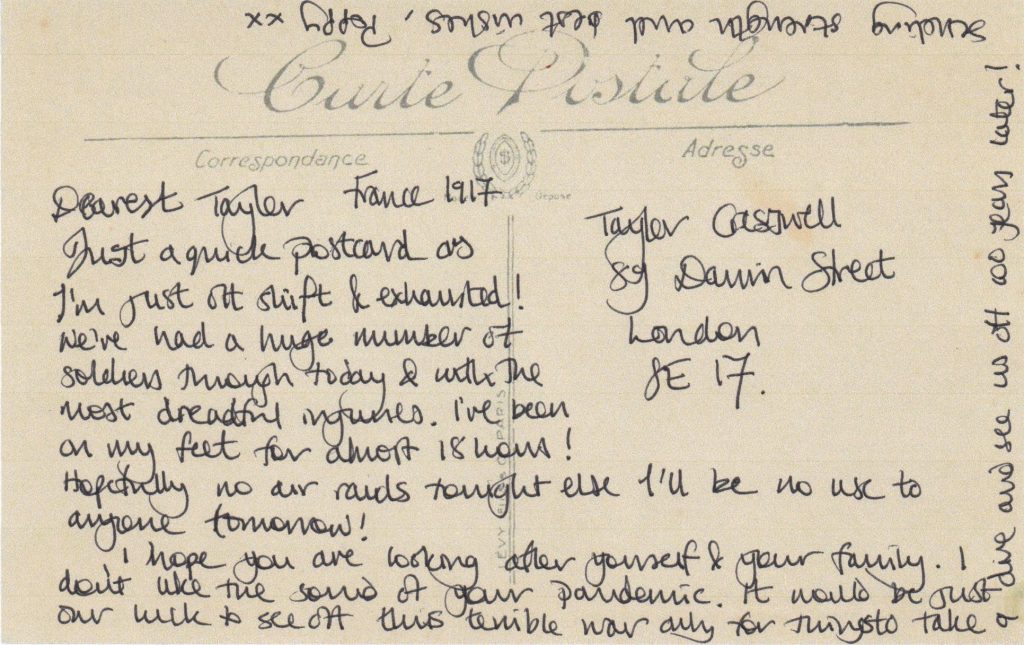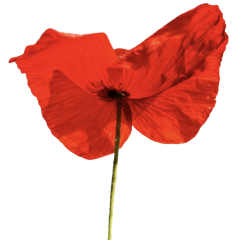Letters between home and the front were a vital way of keeping in touch during the First World War, and of keeping spirits up.
Every week, up to 12 million letters and one million parcels were sent via the post office in a huge operation.
Letters that didn’t arrive could be the cause of great anxiety for women at home waiting for news of their loved ones.Field Service postcards (right) were often used to send news when soldiers were on active service. These postcards didn’t need to pass by censors because soldiers would simply cross out information which didn’t apply, then date and sign the card. These postcards would go some way to reassuring friends and family that their soldier sons, brothers, fathers and friends were alive.
Below is an extract from letters exchanged between Vera Brittain and her fiancé Roland Leighton. Vera was just 22 in 1915 and that summer had started working as a voluntary nurse. Roland was only 20 and had signed up to fight at the front as soon as war broke out and had been sent to France. From Vera, Buxton, 18 July 1915Whence this long silence, dear? I know of course that there is some good reason for it – I am almost afraid to know what. I am so sorry I have not written for so long. I have been extremely busy, but that is not the reason as I’m never too busy to write to you. But I have been waiting to get a letter before writing again – expecting to get one every day, every post in fact. I have such a dread of writing a letter & getting it officially returned unread by the person for whom it was intended – I think that is the most horrible way of learning about casualties that there is. But I cannot wait any longer now, as if you have not written just because you have too much to do, you must be wondering what has become of me & my correspondence… If there is anything wrong, you’ll forgive this selfish anxiety, won’t you? As a day or two ago I picked up the ‘Times’ & saw ‘heavy fighting between Arras & Armentieres’… Goodbye, dear. A Field Service Postcard is all I ask.
From Roland, France, 18-21 July 1915Your letters to me are like an uninterrupted conversation; and I remember afterwards in odd moments what you said, and wonder sometimes if you get tired talking to a phantom in the void who does not answer or show that he has understood.
This letter is bound to be scrappy, I’m afraid, as it has to be written at odd moments…Extracts published in Letters from a Lost Generation, edited by Alan Bishop and Mark Bostridge, 1998

🌸 Write a letter or postcard back from Poppy to you (see three examples below)
🌸 Take a look at the Imperial War Museum’s collection of Letters to Loved Ones for inspiration. London, United Kingdom 16 September 1918 Hello, Daisy, I hope you’re doing well and avoiding your Covid-19 virus. Thank you for your letter and I replied as soon as possible. I’m glad that you say the war is nearly over. I don’t want any more lives to be lost. I am not long out of school, I’m only 23 years old and me and my brother Isaac are living in London. He is off fighting in Malta at the moment, I don’t know if I will ever see him again. I’m glad that our efforts have won women the vote. I have joined the suffrage movement two years ago and our group is growing extremely quickly. Having a female Prime Minister is marvellous even in my own country. Hopefully, there are many more to come, everyone should be equal and if they need to, should advocate for it. As a nurse caring for the most injured soldiers who have been sent home to heal, I know it must be difficult for your hospitals to cope with the in-come of patients. And the Great War has caused many injuries and casualties, as I suppose your virus has. I hope that the future has better ways to cope with injuries than we do now. It would make it much easier for us to cope with overflowing hospitals and never-ending injuries. Don’t let your education be affected by the pandemic it’s the most important thing a young person can have once they begin the rest of their life. Friends are also important, although the internet does sound bewildering. It’s good that you can see them too. I adore being with my friends and we are all working together in the local hospital. At least we see each other every day and haven’t been separated. Thank you again for your letter. I hope this gets to you; our mail is so unreliable it can take weeks to receive letters. Isaac writes twice a week, but sometimes I get one in the morning and the afternoon delivery, and other times I wait weeks. Those times are the worst could be dead and I wouldn’t know. However, let us pass over the miserable part and look towards the light. Stay well and be safe Poppy x

